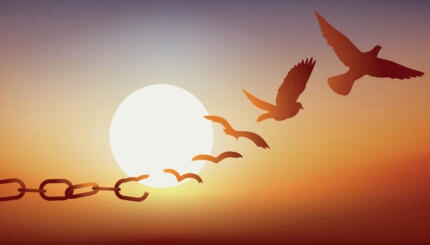I never expected to be the kind of parent whose heart hurt every day their kid was at camp. Before I had kids, I would roll my eyes at parents who complained there weren’t enough pictures of their kids posted on the camp website. And yet, the first two weeks away from my eldest caused unexpected, physical heartache. I wanted more pictures. I wanted hugs.
But there was an unexpected gift in the distance. When our family was reunited at the end of the summer, there was an abundance of love. My two daughters, who usually fight incessantly, were affectionate, kind and respectful to one another. At least for the first few days, everyone was on their best behavior. In a weird way, I felt like our family was being its ideal self. I knew it wouldn’t last; we all soon fell back into well-worn patterns of behavior. But those first few days after camp were gold. There is something about coming back after time away that makes us aspire to be our best selves and imbues our relationships with a deeper love.
Something similar is now unfolding between God and the Jewish people as we begin the Hebrew month of Elul, the period of introspection and repentance leading up to Rosh Hashanah. We haven’t been physically distanced from God over the last year, but we have grown spiritually distant through sin, anger and alienation. Every sin is a betrayal of the covenant that tethers us to each other. Every betrayal broadens the expanse between us. During Elul, we take account of how far the distance has grown. We look at ourselves and our behaviors and think of the myriad ways that we have wronged God, others and ourselves.
It would be natural to see this process as one of pain and shame. No one likes to fully face up to all they have done wrong. But the Jewish tradition depicts Elul as a time of loving return. The name of the month itself is an acronym for a verse from Song of Songs: “I am my beloved and my beloved is mine.” Elul is a time dedicated to teshuvah, which means both “repentance” and “return.” But this is not the return of a recalcitrant and scared child. Rather, it is the return of two lovers who cannot stand to be apart any longer.

Help us keep Jewish knowledge accessible to millions of people around the world.
Your donation to My Jewish Learning fuels endless journeys of Jewish discovery. With your help, My Jewish Learning can continue to provide nonstop opportunities for learning, connection and growth.
In his work Nachal Eshkol, Rabbi Hayyim Joseph David Azulay writes that when God and the people of Israel make amends, God becomes beloved to the people once again, and the people again become intimate with the Divine. Elul is a time of rare favor when God draws close to all who call out in earnest. The Talmud (Yoma 86a) connects love and repentance with healing: “Rabbi Hama bar Hanina said: Great is repentance, as it brings healing to the world, as it is stated: ‘I will heal their backsliding, I will love them freely.’”
Through examining and repairing the harm we have done, we have the opportunity to experience God’s loving and healing touch. The distance between God and the Jewish people, and between the people we are and the people we need to be, can be painful. But the process of reconciliation and return also creates sacred opportunities for new kinds of love, intimacy and healing.
At this moment in Jewish history, we have learned that we can never take the return of our loved ones for granted. As I opened my arms to embrace my daughter at the end of camp, I was acutely aware of the other Jewish mothers who would never know that joy again. Even though the distance between us caused me pain, I also knew that it allowed my daughter to grow, and for us to come back together with a new kind of joy. That kind of blessing means more to me now than ever before.
Whether we are returning to God or to others in our lives, distance is inevitable in relationships and return takes hard work, but the beauty of reunification allows for unique forms of healing and love. As we enter this new year, let us not only mourn the distance that has grown among us, but be open to the type of love that could have only been possible in the breach.
This article initially appeared in My Jewish Learning’s Shabbat newsletter Recharge on September 7, 2024. To sign up to receive Recharge each week in your inbox, click here.



